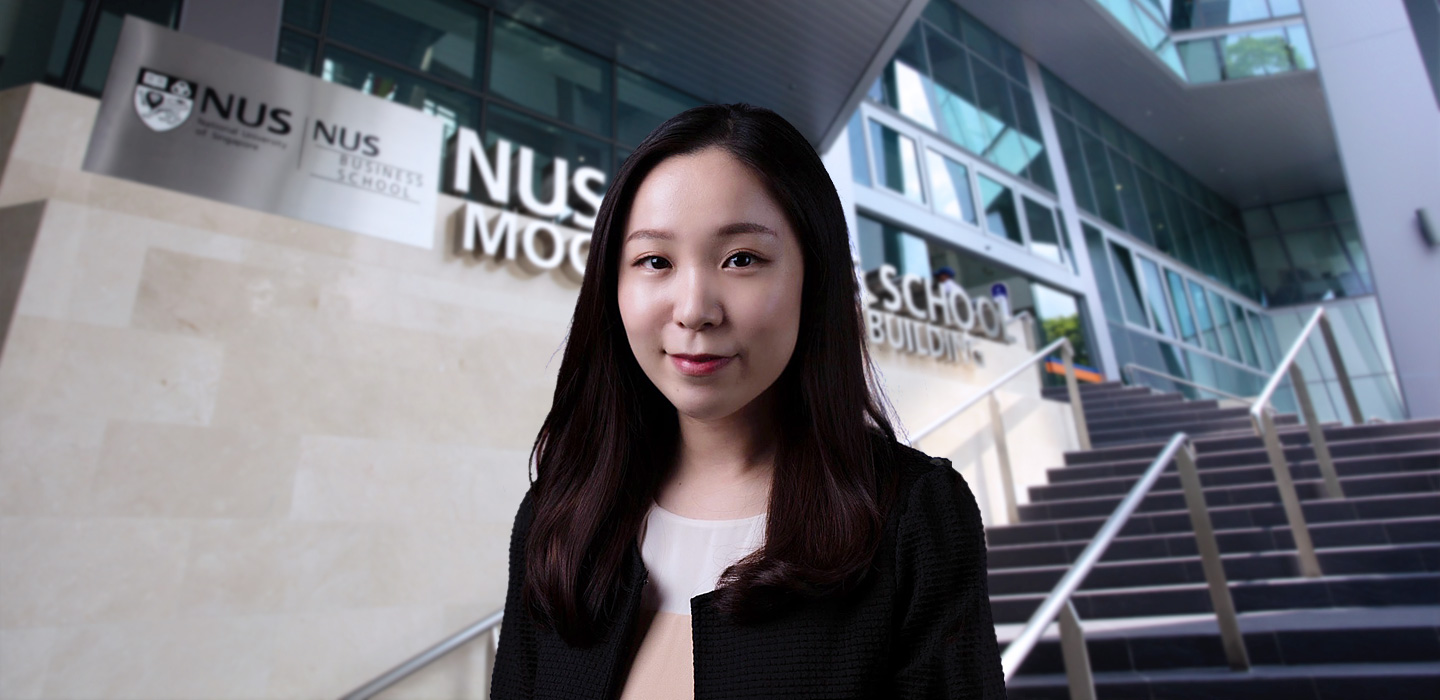Having graduated from NUS Business School in 2014 with a finance specialisation, Hee Jin has plenty of global experience, as she previously lived and studied in Malaysia, and have done internships with Standard Chartered Bank in Korea. She is Korean, currently based in Hong Kong working as a credit analyst at S&P Global Ratings.
Q: Could you share a bit about yourself?
I’m Hee Jin and I graduated from NUS business school back in 2014 with a specialisation in finance. Prior to studying in NUS, I lived in Malaysia and completed my A levels there, before moving to Singapore to study in NUS. I’ve been here for about 9 years since then.
Q: What were your internship experiences like in Korea and in Singapore?
Working in Singapore gives you more global exposure, as it is a regional financial hub. There is also more diversity in terms of work and people I get to work with. I personally feel there is less rigidity and hierarchy – although it may vary across firms – which allows greater flexibility and better communications, as you are able to voice out your opinion more easily.
Q: Why are you particularly interested in debt and credit analysis? What motivated you to pursue roles related to these after graduation?
One of my internships was with Debt Capital Markets at Standard Chartered Bank, and it gave me an insightful overview of the financial markets. I enjoyed the fast-paced nature of markets, as well as helping to raise financing for companies based on clients’ needs. This internship allowed me to better understand and bring clarity on what I wanted to do.
My first job after graduation was in a Korean bank, KEB Hana Bank, where I was a corporate banking analyst handling credit analysis of corporate clients. This experience provided me a good exposure to credit analytical work and understanding about various industries.
I was involved in a fundamental credit analysis of financial institutions at Moody’s. The major difference from my earlier role was that I primarily looked at banking clients, instead of corporate clients. That said, this role is somewhat more challenging as we basically need to look at, not only the banks, but everything – we look at quality of corporates as well as the macroeconomic environment because these are all interlinked, and hence, have impact on banks’ business and operations.
Q: Can you share about your first job experience coming out of graduation to being a Corporate Credit Officer at KEB Hana Bank?
Having done several internships already, I had quite a smooth transition from being a student to my first full-time job.
What I enjoyed working in my first role was the people. I received a lot of support and guidance from my team and mentors. It was a good starting point of my career since it helped me to build a strong foundation. I was also very fortunate to have met and worked with great people, as they are ones whom you spend the most time with, more than your family.
Q: Is there any advice you would like to give to NUS business students seeking a career in finance? Are there any steps they should follow?
Internships are great avenue to explore different opportunities and find out where you interest lies, especially if you are not sure what you want to do. And internship experiences can be valuable to land you a full-time job after graduation. Try to make use of the career workshops and programs at NUS Business School.
I would also advise students to not neglect school work – focus on accounting and finance modules to build a good understanding and solid foundation, as this knowledge and skills are valuable assets.
Lastly, don’t be too afraid of reaching out to people and be confident to network more. Good network can help you to open doors to opportunities that you may not get to come across easily.
Q: What are the traits your industry looks for when hiring?
In my opinion, both hard skill and soft skills are important. We value people with keen interest and knowledge in finance, so try to keep yourself up-to-date with current affairs and developments in the economy and financial markets.
Some of valuable skills sets would be analytical skills, ability to read and analyse financial statements, as well as presentation skills.
Important personality traits are teamwork (ability to collaborate) and curiosity. You should always ask “Why?”, and not just take things as given. Be creative and try to think outside of the box and look at things from different angles.
Q: How do you ensure that you stay above the curve?
It is important to form your own view and articulate it to convince others. There is an oversaturation of ideas nowadays, so quality matters more than quantity. That’s why I believe that being creative and thinking out of the box, of things that others cannot think of, is important to stand out in the industry.
Q: How do you cope with challenges in work?
One of the challenges I face is working on multiple projects with different priorities. I support around 4-5 senior analysts in my role. Working with multiple people can be challenging because everyone has own deadline which you should adhere to, but sometimes it may not be possible to do everything because of limited time.
I try to cope with this by trying to manage expectations. Being able to communicate is important, to make sure that everyone is on the same page. Time management skills are certainly important, as you should try to set priority and plan your work timeline out.



